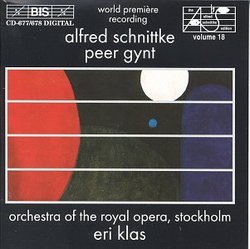| All Artists: Alfred Schnittke, Eri Klas, Orchestra of the Royal Opera - Stockholm Title: Schnittke: Peer Gynt (Complete Ballet) Members Wishing: 0 Total Copies: 0 Label: Bis Release Date: 3/6/1995 Album Type: Import Genre: Classical Styles: Opera & Classical Vocal, Ballets & Dances, Ballets, Historical Periods, Modern, 20th, & 21st Century Number of Discs: 2 SwapaCD Credits: 2 UPC: 789368063123 |
Search - Alfred Schnittke, Eri Klas, Orchestra of the Royal Opera - Stockholm :: Schnittke: Peer Gynt (Complete Ballet)
 | Alfred Schnittke, Eri Klas, Orchestra of the Royal Opera - Stockholm Schnittke: Peer Gynt (Complete Ballet) Genre: Classical
|
Larger Image |
CD Details |
CD ReviewsSchnittke at his greatest! villegem | canada | 12/17/1999 (5 out of 5 stars) "The most accessible and still mysterious music by Alfred Schnittke... and a great recording. You embark on a journey and wish that you'd been there at the premiere, touched by this human adventure. A musical poem Peer Gynt goes far beyong Grieg's spectacular version and carry the initiatic aspect of the adventure. Melodies can be found underlying the complex and less accessible music of the violin concerto No. 5. Therefore this music is A must have for XX century music lovers and Schnittke addicts!" Schnittke at his best R. Andrade | Galicia, Spain | 01/14/2008 (4 out of 5 stars) "Alfred Schnittke's music for the ballet Peer Gynt (freely adapted from Henrik Ibsen's play) is a monumental work full of surprises. Although the music is mostly tonal, relies on a series of themes, and has a Romatic flavour, the composer, known for polystylism, pours many more elements into the mix. Peer's vision of his loved one is accompanied by a truly imposing organ solo, the protagonist's memories are underscored by a whimsical harpsichord tune, and when he goes to Hollywood, we hear a fun ragtime polka for piano. I was reminded of the nostalgic, innocent music of Grieg, Prokofiev's wit, and Mahler's tragedy. The polystylism is not as extroverted as in the Faust cantata, but it never once feels kitsch.
However, the best moment of the work is the epilogue. Clocking at nearly 25 minutes, most of the themes we heard earlier are put together over pre-recorded choir loops. The effect is mesmerizing and cathartic. The orchestra and the conductor are up to the challenge and tackle this mammoth of a score effortlessly. The only problem is the recording, which is often muddy (the harpsichord is nearly inaudible). Nevertheless, this is one of the best ballets of the last decades and one of Schnittke's best efforts." |

 Track Listings (25) - Disc #1
Track Listings (25) - Disc #1